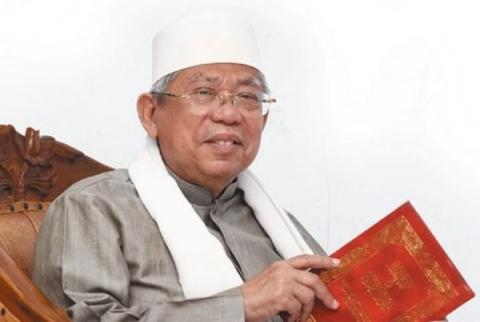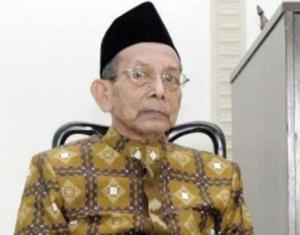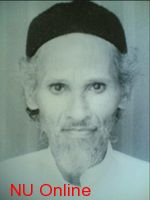His walks are short, the look in his eyes is frequently towards the front and rarely looked down and looked up. He slways seemed to be smiling, egalitarian and dialogic. He never showed himself as a self-effacing person as an important figure in the largest Islamic mass organization of the country, he is KH Ma'ruf Amin (popularly known as Kiai Ma'ruf-ed).
KH Ma'ruf Amin is the supreme leader (Rais Aam) of Nahdlatul Ulama (NU) for the period 2015 to 2020 and the chairman of the Indonesian Ulema Council (MUI) for the period 2015-2020. The two top positions held simultaneously are rarely possessed by a lot of people. The man getting the same position before KH Ma'ruf Amin is KH MA Sahal Mahfudh, rahimahu Allah.
However, in the context of NU, unlike the previous NU supreme leaders who all lived in rural areas, Kiai Ma'ruf has lived in the heart of the capital city, Jakarta. Therefore, He could easily be accessible by the media. He could be interviewed anytime. Moreover he almost comes to office every day; Monday-Tuesday at the MUI, Wednesday-Thursday at the NU headquarters.
It is important to note that Kiai Ma'ruf is not the type of man who likes to stand in the back as such a goalkeeper. If needed, he did not hesitate to come forward, directing the "attack". All this is because he did understand the direction of the wind. Nearly half his life was spent in the political world. He once became a member of the House, from the bottom to the center.
His activities in the realm of practical politics have made some people forget that Kiai Ma'ruf is a skilled jurist (faqih). The students seem to rarely heard his brilliant Islamic thoughts. In fact, as for the writer, if tracing his academic career, Kiai Ma'ruf has a significant role in laying the foundations of renewal of Islamic thought, especially in NU.
In the past when NU was attacked as an organization for the so-called muqallid, Kiai Ma'ruf and his colleagues like Kiai Sahal (Mahfudz), Gus Dur (KH Abdurrahman Wahid), Gus Mus (KH A Mustofa Bisri), Kiai Maimoen Zubair, Kiai Imron Hamzah, and Kiai Wahid Zaini made a number of important breakthroughs. One of them is opening doors of so-called istinbath and ilhaq in NU. This was confirmed in the decision of the NU National Meeting in Lampung NU, 21-25 January 1992.
In the time the resistance of a number of kiai emerged. According to the opposing kiai (clerics), both istinbath and ilhaq are the academic ones of Mujtahids of schools of thought (Imam Abu Hanifah, Imam Malik, Imam Shafi'i, Imam Ahmad ibn Hanbal) or at least those having the same level as such ulema as Imam Nawawi and Imam Rofi'i. And according to them, in NU until now there have been no ulema having qualification as a mujtahid. Therefore, the offer of using istinbath and ilhaq (methods) were irrelevant for NU.
The rejection was echoed from the past even today. But there was no step back from Ma'ruf Kiai et al. Once the sail is hoisted, never receding to the edge. Even in his speech in the NU 91st yesterday, Kiai Ma'ruf still asserted the same academic position, namely his rejection on textualism and stagnation in thinking.
Quoting Imam al-Qarafi, Kiai Ma'ruf was of the opinion that stagnant at literal text of Islam is not adequate to address the issues of the ummah and nationalities today. Al-Qarafi said, al-jumud 'alal manqulat dhalalun fi al din. Even more problematic, said Ma'ruf Kiai, is textualism in understanding religious texts such as the so-called Kitab Kuning (traditional books studied in pesantren-ed)
Since the early 90s to the present, Kiai Ma'ruf has consistently remained campaigning the importance of understanding the Kitab Kuning contextually, an attempt to understand the Kitab Kuning completely by understanding the context when the text was compiled by its author.
Even, like most other Islamic reformers, Kiai Ma'ruf has most of the time promoted the idea of the benefit (kemaslahatan). An adage that potentially inhibits the landing of welfare and curbs the dynamic of Islamic thought in general that is tried to be modified by Ma'ruf Kiai. The adage that reads in part, al-muhafadhah 'alal qadim al-Salih wal akhdzu bil jadidil ashlah.
This rule actually requires a balance between taking care of tradition and innovation efforts. However, in implementation, the weight of caring for traditions is larger so that the portion to do innovations of thought is inadequate.
In terms of substance, the rule is certainly not problematic and is even very good. However, according to Kiai Ma'ruf, the rule needs to be completed. Kiai Ma'ruf offers the rule modification, nmaley al-muhafadhah 'alal qadim al-Salih wal akhdzu bil jadidil ashlah wal ishlah ila ma huwal ashlah tsummal ashlah fal ashlah.
The point, according to the Ma'ruf Kiai, is that the benefit should always be reviewed. Because, "may be something is considered good today, two or three years it is no longer good", said Ma'ruf Kiai. Therefore, a search on the discovery of the benefit is the peak of academic work that needs to be conducted.
But, as other Islamic thinkers, Kiai Ma'ruf has never open istinbath in the realm of worship. While in the realm of so-called mu'amalah including siyasah (politics), Kiai Ma'ruf has continued to carry out any possible exploration and innovation of thought. Hopefully keep healthy always, Kiai.
KH Abdul Moqsith Ghazali, Vice Chairman of the Problems Deliberation Institute (LBM) NU.
Terpopuler
1
Khutbah Jumat: Ramadhan dan Kesempatan yang Tidak Selalu Terulang
2
Innalillah, Ulama Mazhab Syafii asal Suriah Syekh Hasan Hitou Wafat dalam Usia 83 Tahun
3
Kultum Ramadhan: Lebih Baik Sedikit tapi Istiqamah
4
Khutbah Jumat: Ramadhan, Melatih Sabar, Memperkuat Syukur
5
Keluar Mani yang Tidak dan Membatalkan Puasa
6
Khutbah Jumat: Tiga Kebahagiaan Orang Puasa
Terkini
Lihat Semua















